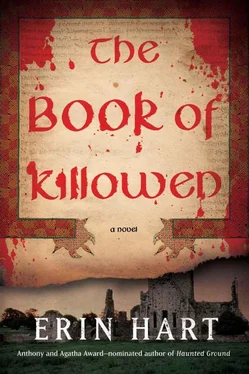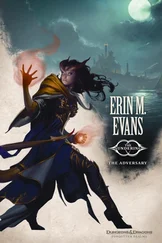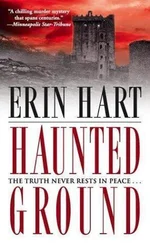“I don’t know how many more times I can say it. I did not kill Vincent Claffey.”
“But you admit that he was blackmailing you. How much had you paid him?”
“I already told you—two thousand euros. It was all I could manage.”
“And he wanted more.”
“Yes, but I was going to work that out. I would never have killed anyone over something as…” Dawson shook his head and sighed.
Cusack kept silent, waiting for the weight of guilt to do its work.
“Look, I went home to Dublin yesterday, told my wife everything—about all the mistakes I’d made, about Anca, about paying off Vincent Claffey to keep him quiet. I should have told her everything ages ago. I wouldn’t be here now if I had.”
He looked as if that wasn’t all he had to say. Cusack waited.
“I was there, in Claffey’s shed, two nights ago. He was dead when I arrived, I swear. But he wasn’t up on the machine, the way we found him the next morning. He was on the floor, and there was a small pool of blood under his head. I panicked. I didn’t know what to do, so I left him there. I ran. I’m not proud of it, but there was nothing to be done.”
“You could have rung emergency services.”
“And made myself a suspect right away?”
“So what were you doing there, in the middle of the night?”
“I needed to speak to Anca. Cormac said he’d heard her at Beglan’s, so I headed there first. But no one was about, so I headed over to Claffey’s—she obviously had some connection to the man. They might have been working together, or he might have been forcing her to do things, I don’t know.” He stopped and looked at Stella. “I never did find her.”
“There was no one at home at Beglan’s, at three o’clock in the morning?”
“No, but the door was open. I just needed to talk to Anca. But there was no one home.”
“Where was Anthony Beglan?”
“I don’t know. I told you, I never saw him, or Anca, or anyone except for Vincent Claffey, who was—”
“—already dead when you arrived. Did you bother to check for a pulse?”
“There was no need, Detective. It was obvious that he was dead.” Dawson let out a breath, reliving the moment of discovery.
“Anca Popescu says she was hiding in the shed. She says you and Claffey argued, that you pushed him, and that he fell backward, hit his head—”
“That’s not true! Anca might have done for Claffey herself, did you not think of that? She had as much in the way of motive as I had. And easy enough to pin the crime on me, stumbling over the body like some feckin’ gombeen—”
The phone on her hip began to play Lady Gaga, and Stella rose from the table. The tiny screen said, “Home,” and Stella remembered with a stab of regret that it was past five on Sunday. Lia was due back from her father’s now. She’d hoped they could have dinner together, maybe watch a film on television. Shit.
Stella took the call in the corridor. “I’m sorry, I’m right in the middle of an interview here, Lia.” She couldn’t say anything about the case, or the Serious Crimes Unit. All of that meant sweet F-A to a seventeen-year-old anyway. “Why don’t you have something to eat, just to tide you over until I get home? I can swing by and pick up a pizza on my way—”
Lia put her hand over the mouthpiece, and the muffled sounds seemed as if she was conferring with someone. “Lia, is someone there with you?”
After a brief pause, a familiar male voice came on the line. “It’s me, Stella. I can take her back to the flat if you’re tied up.”
“I’m not here all night, Barry, I just have to take care of a couple of things, and then I’ll be home. It’s not a problem.”
“Look, it would be easier, wouldn’t it, if I just take her out for dinner? You can let us know when you’re home.”
“Are you not busy with Allison this evening?” Stella cringed at the sound of her voice, the tone that managed to sound both chilly and pathetic.
There was the briefest pause before Barry said, “No, not tonight.”
Stella held the phone to her ear, trying to stay calm. “Could you put Lia back on?” When her daughter took the phone again, Stella said, “Your father says he’ll take you for a bite to eat. That might be best—I’m rather tied up here at the minute. But I’ll see you when I get home—”
“No you won’t. I’m going back to stay at Da’s.”
“I’ll only be a couple of hours—”
“That’s what you always say.” There was a curt beep as Lia rang off.
Stella gave the wall a vicious kick before joining her suspect once more.
“We had a look around your room at Killowen,” she said to Niall Dawson, “and we found these in your case.” She opened her hand and let a handful of gallnuts spill onto the table. Dawson stared at the incriminating evidence, then up at her.
“They’re not mine, I don’t know where they came from. Someone else must have put them there.”
“You do know what they are?”
“Of course I do. They’re oak galls.”
Stella set one of the gallnuts on the table directly before him. “Can you think of any reason why these might have been left as a calling card in two murders?”
“Two murders?”
“You’ve admitted you were at Killowen between the twenty-second and the twenty-fourth of April, when Benedict Kavanagh disappeared into the bog. Tell me something. If I start digging, will I find that you have a prior connection to Kavanagh as well?”
Dawson looked at her, jaded now, mistrustful. He reached out and carefully moved the single gallnut back to her side of the table. “Back to you, Detective. Someone’s trying to frame me. I suggest you find out who it is.”
Cormac stood at the top of the stairs, listening to the conversation around the dinner table below. A different, quieter sort of crowd tonight. Niall was missing, of course, but there were two new voices—Mairéad Broome and Graham Healy had evidently joined them. Why had they suddenly become sociable, after three days in isolation? Cormac started down the stairs, realizing that he was seeing everyone at Killowen in a new light since the visit to Hawthorn House and his conversation with Shawn Kearney this afternoon.
He’d been thinking of the stunning detail on the book shrines in the National Museum, with their elaborate metal covers studded with jewels, the intricate knotwork designs and large-eyed human figures that mirrored the high crosses. The Cumdach Eóghain , if it was like the book shrines he’d seen, would be priceless, something that might prompt a private collector to offer a huge sum. The tricky part was finding a person or an institution not so particular about provenance. Such buyers did exist; there was no doubt about that. But would the sale bring a fortune worth killing for? Two men were dead—perhaps therein lay the answer.
When the phone in his pocket vibrated, he stepped into the sitting room at the bottom of the stairs and closed the door behind him.
“You’ll owe me two bottles of whiskey when you hear this,” Mac-Sweeney said.
“Done. What did you find?”
“I rang up a friend at Cambridge, the one who invariably has all the gossip. Seems your man Gwynne is an expert on ancient manuscripts. He got his start at Cambridge, doing research under the famous paleographer T. A. Priest, the top man in medieval history there. When Gwynne left Cambridge, he went to work for the British Library.”
“Thanks, Robbie. I’m not sure how all this will help, but it’s good to know.”
“I’m not finished. The scuttlebutt is that Gwynne was let go from the British Library, more than twenty years since, when a rare manuscript in his charge went missing. He claimed innocence, of course, and I gather there wasn’t enough proof to prosecute. When are you going to tell me what this is all about?”
Читать дальше












